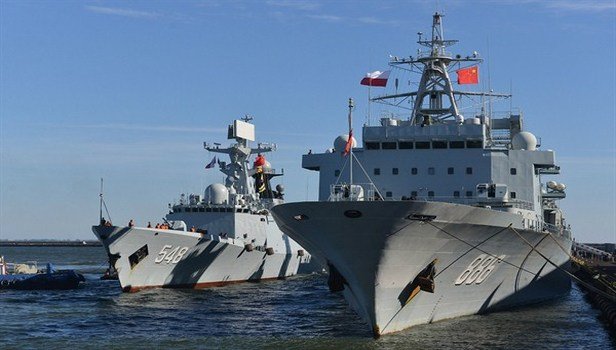Now It is Not Easy for India and Japan to Stop China
18 Sep 2017 ( IBTN News Bureau )
Last week, Japanese Prime Minister Shinzo Abe's visit to India was highly appreciated by the foreign media. There was also a stir among the Chinese media about this tour.
The Chinese media saw this tour with a suspicion of doubt. However, it also said that China will not make any difference with this friendship. On the other hand, the Chinese Foreign Ministry said that there should not be any third party in the border dispute between India and China.
The Global Times is the mouthpiece of the ruling Communist Party of China. It is said that this newspaper puts China's stand in front.
On Monday, Global Times has written that Japanese Prime Minister Shinzo Abe has visited India three times in the last four years.
Global Times has written, "There is a civil nuclear agreement in India and Japan in November 2016. Abe's visit to India was also important. Japan deliberately ratified this agreement with India, while knowing that India has not signed the Nuclear Non-Proliferation Treaty.
"Abe has also approved the grant of US-2 Amphibian aircraft to India. This is the most important security agreement with India. India has become the most sought after country in development work from Japan."
The Global Times has further written, "In every visit to India and Japan leaders, China comes at the level of priority. In this Indian media, this visit was highly valued due to the Dolaam controversy. India should be cautious about the way Japan is confusing China."
The newspaper has written, "Japan is taking advantage from India on the issue of China. In May of this year, USA and Japan joined China's One Belt One Road, while India boycotted it. India can see it as an example that India boycotted it, while Japan joined it.
At the same time Forbes has written that India and Japan have now come together in view of the spread of China in the trade routes of the Indian Ocean.
Although Forbes has written that it is not easy to stop the expansion of China in the Indian Ocean with the new mission of India and Japan.
Forbes has written that both the countries have made a lot of delay and there is not enough resources.
Forbes wrote, "Japan is helping India's infrastructure and its nuclear capacity improve. Both the countries are going to perform joint naval exercises in the Indian Ocean. Earlier, the two countries had done naval exercises in the Bay of Bengal last year."
"The Indian Ocean has always been a strategic water space for business from other Asian countries with Africa and the Middle East. In recent years, China has expanded its footprints here."
Forbes further wrote, "China's without strong presence in the Indian Ocean can not even be dominated in the South China Sea. The reason for this is that the Straight of Malacca is a blockade. The United States and its allies can shut down China's oil supply from the Middle East. Along with this, China can be isolated from Africa."
Although Forbes says that India and Japan have delayed a lot. China has already acquired Hambantota Port in Sri Lanka. Now this port will be in the possession of China for 99 years. Simultaneously, China is building an economic corridor through Pakistan to connect with the Middle East and Africa.
Forbes has written in another report that friendship between India and Japan is troubling China.
Forbes wrote, "Recently, the army of India and China were face to face in Dokmal. China was building a road there and India stopped it. For 73 days, the two countries' army was face to face at a distance of 120 meters. Even now the soldiers of both countries are face to face 150 meters away."
Time Magazine has also paid a lot of attention to Shinzo Abe's India tour. Time has written that informal relations between Modi and Abe can be realized.
Time has written, "Japan and India are the second and third largest economies in Asia. The trade between the two is still small. In 2013, trade between the two countries was $ 15.8 billion, which is barely one-third of China and India's trade."
"Japan's direct investment in India between 2007 and 2013 has reached $ 15.8 billion. Japan has emerged as a major investor in investing in India. However, Japan's investment in Vietnam and Indonesia is more than India."
Time has written that this picture may change in the future.
Time has written that considering the growing influence of China, Indian Prime Minister Narendra Modi wants to increase India's military power with the help of Japan.
(Click here for Android APP of IBTN. You can follow us on facebook and Twitter)
Share This News
About sharing
-
 10 Sep 2025
LIVE: Hamas says leaders survive Israel’s attack on Qatar’s Doha
10 Sep 2025
LIVE: Hamas says leaders survive Israel’s attack on Qatar’s Doha
LIVE: Hamas says leaders survive Israel’s attack on Qatar’s Doha
-
 07 Sep 2025
LIVE: Israeli attacks on school, tents and homes kill at least 17 in Gaza
07 Sep 2025
LIVE: Israeli attacks on school, tents and homes kill at least 17 in Gaza
LIVE: Israeli attacks on school, tents and homes kill at least 17 in Gaza<...
-
 31 Aug 2025
Live: Yemen’s Houthis confirm Israeli strike killed group’s prime minister
31 Aug 2025
Live: Yemen’s Houthis confirm Israeli strike killed group’s prime minister
Live: Yemen’s Houthis confirm Israeli strike killed group’s prime minis...
-
 26 Aug 2025
LIVE: World outraged over Israeli attack on Gaza hospital, journalists
26 Aug 2025
LIVE: World outraged over Israeli attack on Gaza hospital, journalists
LIVE: World outraged over Israeli attack on Gaza hospital, journalists
-
 24 Aug 2025
LIVE: Israel expands Gaza City offensive, two more starve to death
24 Aug 2025
LIVE: Israel expands Gaza City offensive, two more starve to death
LIVE: Israel expands Gaza City offensive, two more starve to death



